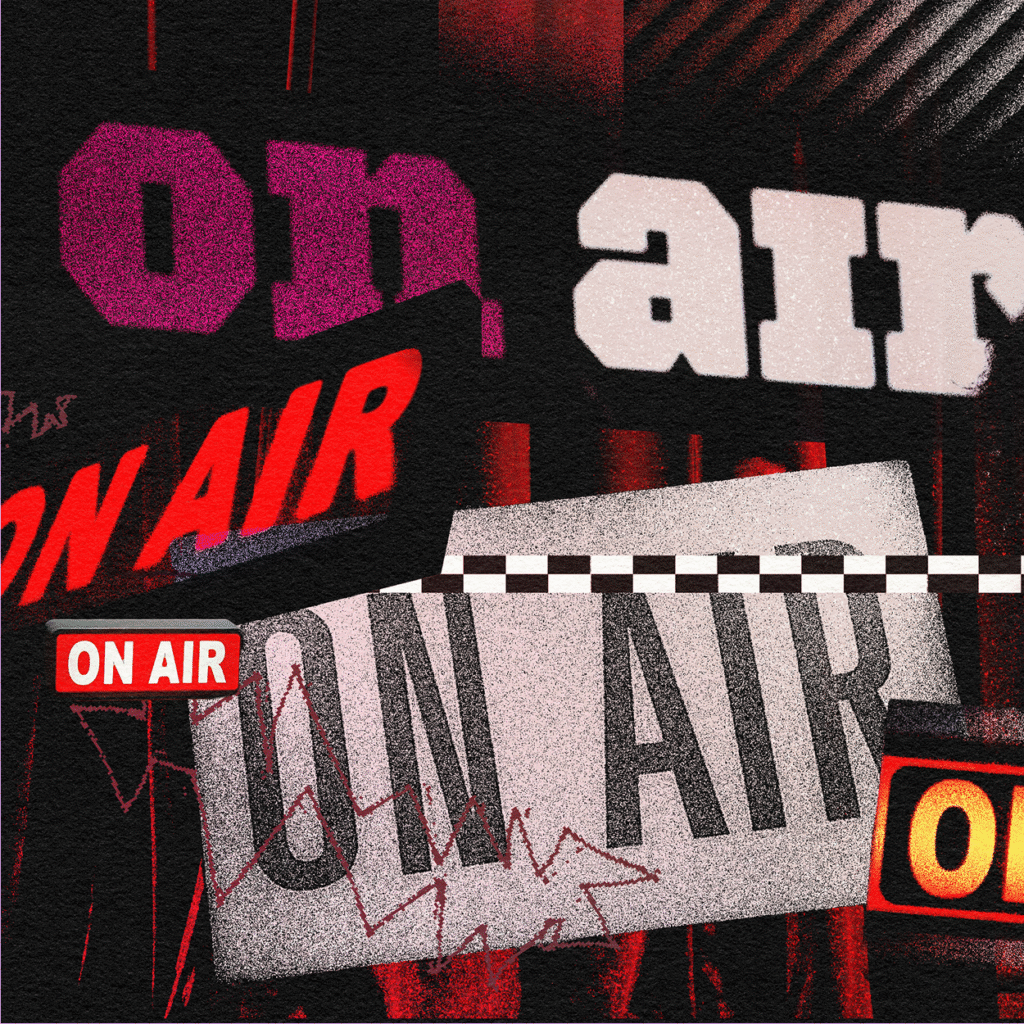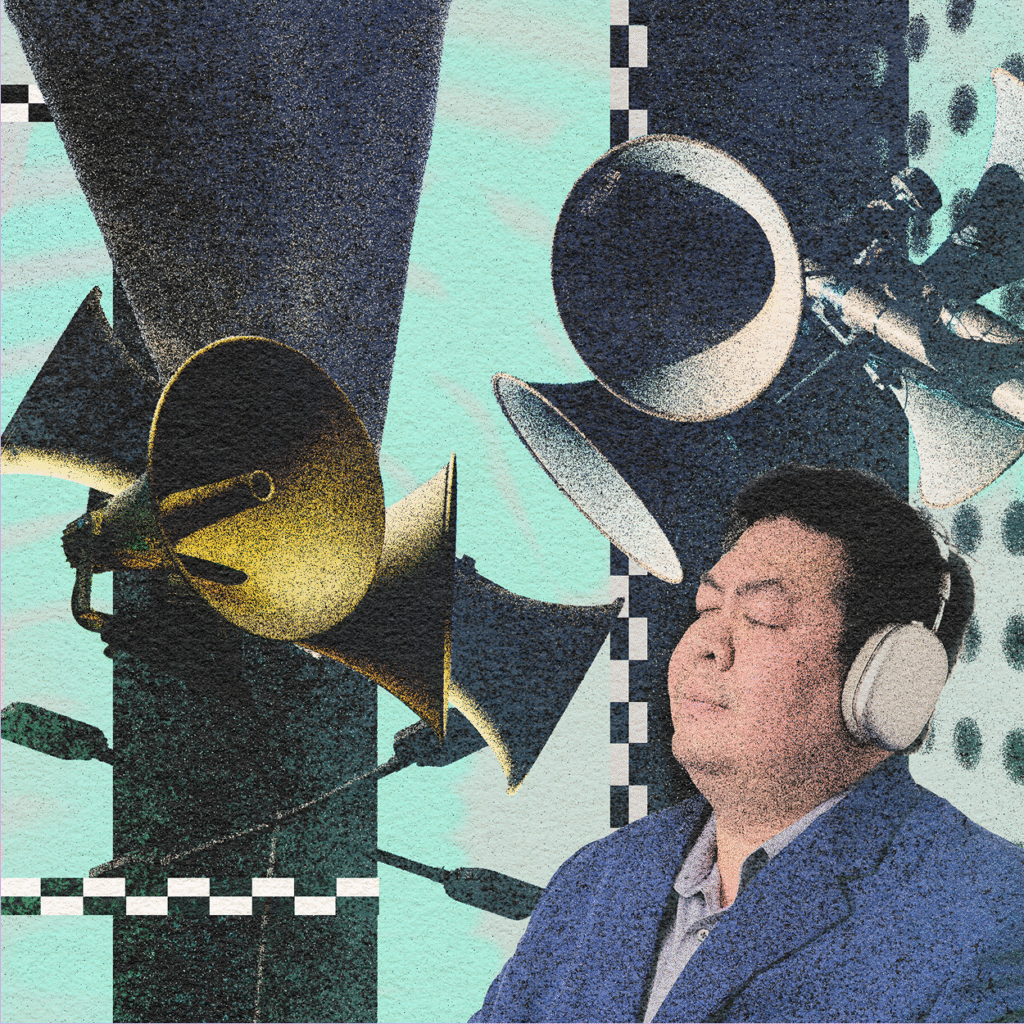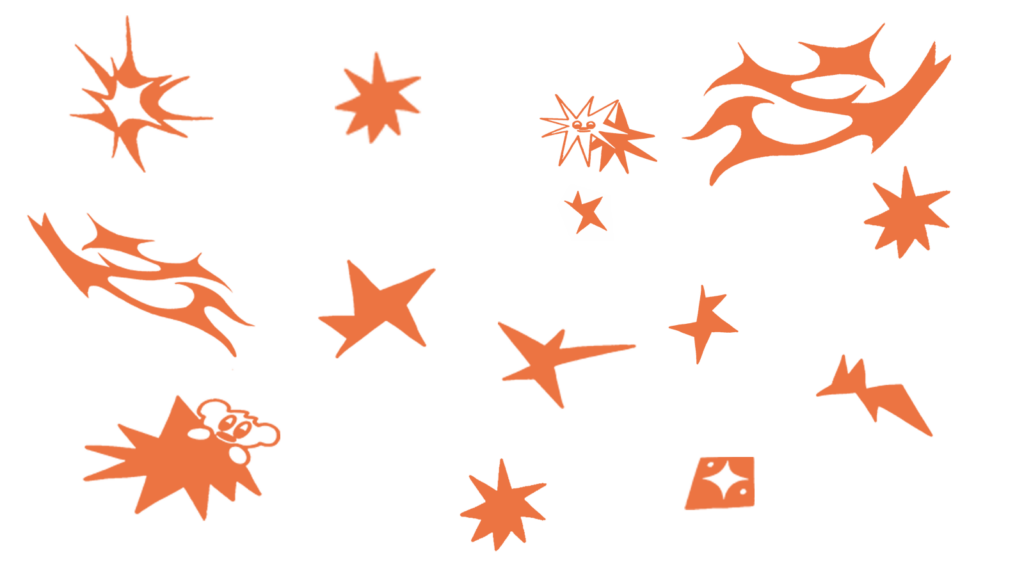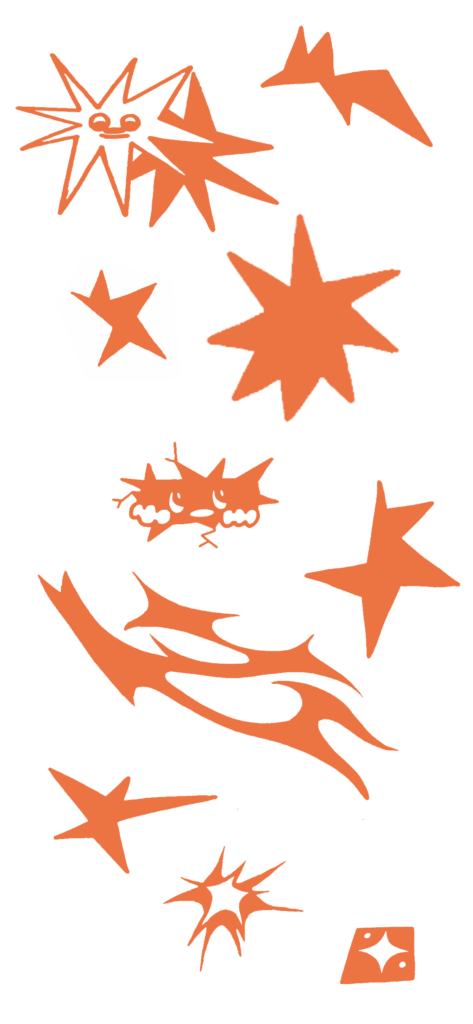The Parasocial Club
On the edge of a calm gray lake, there’s a dark Gothic building that’s home to a highly selective university. Despite the school’s bleak motto—Do Not Learn to Succeed. Learn to Survive.—students and grads alike seem proud of their time there. They can be found sporting their University of Elysium merch out at the bar and staying connected to the community through Twitter, Reddit, or Discord, where they chat about everything from cheese to recent soccer games.
The bond is a real one—even if the university is actually just an illustration on a role-playing game map. The school is one part of an extensive mythology that’s been cooked up on a fan Slack channel for Always Cheating, a podcast about fantasy English Premier League soccer.
While this particular manifestation of podcast fandom may be unique, the development of a robust community around a show is not. Podcasting has become a medium that creates true social connection between creator and audience, one that goes beyond the parasocial feeling that’s long been a part of media consumption. The stakes are real, too: podcast communities can drive subscriptions but also crank up stress; they can broaden audience while producing tunnel vision; and they can create friendships and organize mobs. At their best, however, they may flip the traditional dynamic entirely—making hosts feel lucky to finally meet their fans.
All kinds of podcasts have a social life beyond each episode—or at the very least, most creators try to create one. Popcast, the music show from The New York Times, has a Discord server with 41 active chat channels, from “duolingo-not-dua-lipa” to “taylor-takes.” There are 15 Facebook groups for the celebrity news show Who? Weekly that each have over 300 members. There were listening meet-ups in 50 cities for the 125th episode of the poker-tech-politics podcast All-In. Paid subscription membership programs—like The Black Girl Bravado’s “Homegirl Hangout,” My Favorite Murder’s “Fan Cult,” and Pod Save America’s “Friends of the Pod”—make it clear that a monthly fee can grant you access to a new social world and proximity to your favorite podcasters. Even more traditional radio shows are recognizing the potential, too: Radiolab’s “new membership experience” called The Lab has three membership tiers at $5, $10, and $20 a month. They’re differentiated by level of access, and culminate in conversations with the hosts and a birthday shoutout.
Part of the draw of paid podcast communities is access to the talent that most people can’t find elsewhere. Succession fans are not having barbecues with Jeremy Strong; hip-hop heads aren’t chatting about music in a Facebook group with Drake; Sally Rooney’s readers aren’t meeting her at the pub to talk about what she should write next. But it’s possible to do all of those things with podcast hosts, and not just because the scale of celebrity is smaller. Their success—and income—is often built through direct relationships with fans. “The community is the show,” one host tells me. “Without the community there is no income.”
“People throw around the term ‘parasocial’ a lot,” says Tammy Kim, a New Yorker contributing writer and a co-host of the independent podcast Time to Say Goodbye (TTSG), “but for us it seems like the ‘para’ fell away very quickly and just became very in-person social.”
TTSG found a niche not because of format but because it offered a reflection of an identity that wasn’t being adequately engaged by other forms of media
Time to Say Goodbye originated in part from an acute social gap caused by the pandemic and the desire, according to Kim, to have “the kinds of conversations you would have at bars but weren’t having at bars.” Many episodes do sound like that—particularly if your kind of bar conversation tends toward social movements and geopolitics, with a touch of NBA and K-dramas. Like many chat shows, TTSG found a niche not because of format but because it offered a reflection of an identity that wasn’t being adequately engaged by other forms of media. Jay Caspian Kang, the other co-host (and also a staff writer at the New Yorker), explained the show is “directed towards a somewhat small audience which is, like, ‘Asian Americans with left politics.’”
Accordingly, despite some hesitance about the possibility that an online forum could descend into chaos, Kang thought “it would be cool if all these people who listen to our very specific show could talk to one another.” A first attempt on Telegram was quickly overwhelmed—but the subsequent subscriber Discord thrived (access granted with the cheapest subscription at $3 per month), producing reading groups, spin-off servers, friendships and at least “three or four couples,” and offshoot TTSG meetups in half a dozen American cities and in Seoul. Many shows follow some version of this model: listeners become paid subscribers, subscribers join an online community, and the community creates offline space. TTSG is an example of a show where hosts are moderators as well as community members themselves; they talk openly about the friendships they’ve made. “A lot of people felt like they hadn’t met that many people before like them,” says Kang. Finding the show seemed to produce “this great sense of relief for them. Which for me and Tammy to watch was really, really cool.”
When Brandon Kelley, one of the co-hosts of Always Cheating, was one year into making his podcast, a listener was passing through New York and suggested they meet up and watch a game together. “Your immediate impulse is: ‘This is strange. Is this dangerous?’” Kelley says. But they met up with him and felt a kinship and subsequently found the same with other listeners. The experience validated the project. The message, according to Kelley, was “let’s keep going, this community is definitely worth having and worth building, and there are probably more people out there who would enjoy this community.”
But creating a podcast community isn’t always so seamless. It’s also, increasingly, a critical business necessity for a show’s ability to sustain production, drive up subscription revenue, and generate show content. For example, TTSG’s only income is from Patreon and Substack subscriptions, enough to pay a producer and make the show viable. Josh Landon, Always Cheating’s other host, is clear-eyed about the utility of building a podcast community. “One of the reasons we started the Patreon at all was that we needed the motivation,” he says. “I don’t ever want to miss a Sunday night pod, because we have these people who have gone out of their way to support us, in some cases for many years. I want to respect them and it helps me feel like we put in a shift.” Other hosts agree that the expectation from paying subscribers helps keep up momentum. “It forces you to do all the episodes,” Kang admits.
The Always Cheating hosts are particularly vocal about demonstrating their connection to supporters. They read the names of all “Producer” ($15 per month) level Patreon supporters during each episode, and often share the names of leaders of their league. Supporters “get to feel like they’re getting more of the white glove treatment with their name being read out.” The hosts also use leagues and competitions as incentives for support, introducing new leagues to subscribers when they feel audience engagement is ebbing. The league on which the Elysium mythology is based is one of the most popular offerings, and it was invented by fans. “I think that speaks to the power of having an engaged community, is they then generate content for us,” Kelley says.
Using listeners for content is not new—the listener mailbag is a natural evolution of radio show call-ins—but the ways it sustains them is. Hosts and producers can trawl activity on official Discords for topics to cover and lurk in unofficial Facebook groups to take stock of how their takes are faring with their most devoted audiences. Peggy Cachere is one of three volunteer moderators (covering the essential London, Eastern, and Western time zones) in the vigorous, 10,000-member Facebook group for The Watch, a Ringer podcast about movies and television. She’s never met the hosts, Chris Ryan and Andy Greenwald, but knows they’re keeping up with the zeitgeist. “Sometimes they reference things that are very clearly from the group,” she says. “I think it gives them a little feedback as to how the podcast is coming across to clearly big fans that bother to join a Facebook group about it.”
Other shows rely entirely on the kindness of listeners. The content of Normal Gossip—“Juicy, utterly banal gossip about people you’ll never know”—is largely dependent on the community, as it sources gossip from its own audience. Co-creators Alex Sujong Laughlin and Kelsey McKinney, both co-owners at Defector, field potential stories by text, email, and voicemail, and the most successful submissions come from subscribers—people who really understand the format of the show and what kind of story will work.
The top tier of Normal Gossip subscription, aptly called the “Friend” ($12 per month), offers access to the show’s “Close Friends” circle on Instagram as well as the chance to be the featured guest on a subscriber-only episode. But ultimately, a real friendship with the hosts is not the endgame. “Our goal is not to use the show as a way for people to create community with us,” McKinney says, “our goal is for people to use the show to create community amongst themselves.” She mentioned a group at a recent show that showed them temporary tattoos with references to the show they’d made for a bachelorette party. “This is what we want. We want people to be using this as a common culture for themselves and we’re just the people that give it to them.”
When podcast listeners really work to create community, it can sometimes become bigger than the show itself. The Patreon for the show Dopey—“The podcast on drugs, addiction, and dumb shit”—has just over 500 members, but an unofficial private Facebook group has 6,000 and more than ten new posts a day. The Patreon offers access to Zoom hangouts with the host, Dave Manheim, as a subscriber perk at $5 per month (but Manheim says he’s not strict about excluding $2-per-month subscribers). But at the start of the pandemic, independent of Manheim, the Facebook group launched Zoom recovery meetings of their own, which now meet 20 to 25 times per week.
The “Dopey Nation” that is sustained both by official content and events as well as unofficial organizing has created an alternative brand to mainstream recovery. “It helps a lot of people recover, honestly—some people that would never in a million years step into a meeting or even approach recovery,” Rachel Angel, a listener and a musician who’s contributed a song that’s played on the show, told me. “It gives a platform for people to connect to their recovery in a sort of irreverent way—at least that’s what it is for me.”
Being at the core of a community of “drug addicts with a sense of humor,” Manheim has had to deal with professional hazards that resemble that of a counselor. “It’s been a very painful process,” he tells me, marked by deaths of listeners, friends, and his co-host. “People can say it’s life and death, but it is. It’s scary, it’s powerful, it’s rewarding, but also you have to keep some kind of perspective that you can only do what you can do.”
While Dopey may be on one end of the spectrum, taking on any project of community-building presents a lot of additional labor. “I remember being at the post office in the basement of Rock Center, spending 14 dollars to send a button to someone in Australia,” Kelley of Always Cheating recalls, “and I was like ‘this doesn’t make any sense, this person doesn’t even want this.’” It took Kelley and Landon years of trying different kinds of incentives to find out that the extra subscriber-only podcast was what would boost numbers on Patreon.
Moderating and monitoring official communities is another potential drain. “On the community end of things, we’re engaging virtually 24/7,” Kelley says of the texting, Discord, Twitter, and Reddit activity required to sustain connection. Spotify relinquished control of the Facebook group for The Watch in the fall of 2021 because it required too much work for staff to moderate. “We don’t have a [an official] Discord, we don’t have Facebook groups—a lot of that is because we don’t want to stretch ourselves too thin,” McKinney, the Normal Gossip host, says. “The thought of managing a Discord makes me want to claw my eyes out.”
Even when hosts authentically enjoy being part of their community, vigilance over one still takes time and comes with other dangers. The hosts of TTSG, among others, grapple with how much their Discord should influence what happens on the show. They’ve done episodes off of suggestions and have used the space to take the temperature of the group. At the same time, “the fear I have always,” Kang says, is that “the amount of people who are active on the Discord is five percent or less of the actual listenership” and that they could end up with a situation “where the most active users enforce a type of tyranny, and people feel like they have to bend.” When they’re considering questions about the podcast, like how political to make something, who to interview and who not to interview, Kang says, “I wonder, ‘OK, are we going to get too pushed by this group of people?’ And that’s also counterbalanced with the idea that you want to reward the people who are the most ardent listeners.”
Deciding which parts of the community to monitor and listen to is essential for bigger shows that get mountains of incoming requests. McKinney and Laughlin say they’ve established practices to avoid an onslaught of online opinion. Part of their goal with the show, McKinney says, “is not only making sure our listeners have a good product to consume, it is making sure our team is protected enough to make the product they liked in the first place. Which means that someone who is not us reads reviews.”
Indeed, an organized podcast community is organized for better or worse. The same structures that can drive listenership can also coordinate discontent. “I used to say that I was scared, that it was like having spiders in a terrarium and that one day they would turn on me and get out of the terrarium and come after me,” says Dopey’s Manheim. He feels that pressure as he tries to navigate the humor, transgression, and respect required for his subject matter. “You don’t want to say the wrong thing, but I also want the show to be really funny. And I want to say things that people don’t normally say. But I don’t want people to not think I’m cool. So I’m fearful,” he says, “I never want the audience to turn on me.” Manheim says that he’s more comfortable now than he used to be—and “just grateful to be among them”—but still knows that when he missteps, he’s going to hear directly about it. Landon and Kelley of Always Cheating use the shorthand “furniture talk,” based on an unpopular aside in one episode, for the kind of topics they’ve learned may raise the ire of their supporters for straying from the expected product.
Despite these drawbacks, Kang revels in having a connection to his audience that’s real. “This is our own space,” he says. “The audience is not as big as the other job we do, but at least the audience knows who we are in a much more unvarnished way, and I really appreciate that. If it wasn’t for that I don’t think I would do the show, because the financial rewards are not very big and it’s kind of weird to me to do a show where every week I just talk for an hour and a half.”
In traditional media production, Kang sometimes feels an alienation where he doesn’t “even care who the audience is—I’m just gonna type my thing and who gives a shit.” With Time to Say Goodbye, “I understand what the point is because I’ve met a few hundred people in person who tell me that they like to listen to the show and that it’s meaningful to them and it’s meaningful enough for them that they’re willing to join a chat server, or to even come out in person to a thing. That’s a type of love that is very difficult to access in other forms of media.” That experience has made him “more aware and appreciative of audiences in general.”
Similarly, Laughlin reflects on seeing Normal Gossip listeners during their live tour and being reminded that “when you see all of those download numbers, those are people.” Studies have suggested that socially engaging with podcasts and feeling connected to hosts may produce greater senses of meaning and relatedness in listeners. Perhaps the benefits flow both ways.
![]()
Stephen Lurie is a writer and facilitator living in Brooklyn. He can be found at stephenlurie.com.








